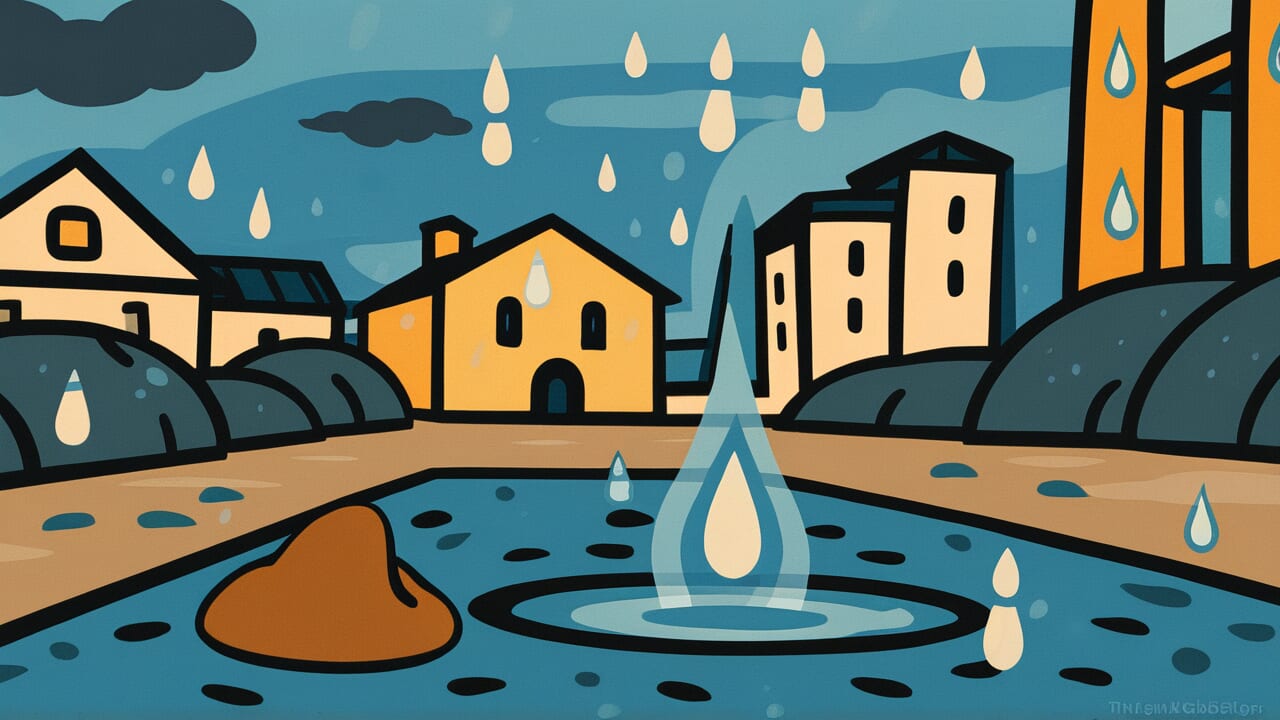How to Read “The rain falls alike on the just and the unjust”
“The rain falls alike on the just and the unjust”
[thuh rayn fawlz uh-LAHYK on thuh juhst and thuh uhn-JUHST]
Meaning of “The rain falls alike on the just and the unjust”
Simply put, this proverb means that life’s circumstances affect everyone equally, regardless of whether they are good or bad people.
The literal image is straightforward. When rain falls from the sky, it doesn’t choose where to land. It soaks both honest people and dishonest people. The deeper message is about fairness in life. Good things and bad things happen to everyone, no matter how moral or immoral they are.
We use this saying when life seems unfair. Sometimes bad people seem to get lucky breaks. Sometimes good people face terrible hardships. This proverb reminds us that natural forces and random events don’t care about our character. A storm damages the house of a saint and a criminal equally.
What’s interesting about this wisdom is how it challenges our desire for cosmic justice. Many people want to believe that good deeds are always rewarded. This proverb suggests that’s not how the world works. It’s both comforting and unsettling at the same time.
Origin and Etymology
This proverb comes from the Bible, specifically from the Gospel of Matthew. Jesus spoke these words during his famous Sermon on the Mount. The exact verse refers to God making the sun shine and rain fall on both good and evil people.
The historical context was important for early Christian teaching. Jesus was explaining that God’s natural gifts come to everyone. This was a radical idea in ancient times. Many cultures believed that gods punished bad people with disasters and rewarded good people with prosperity.
The saying spread through Christian communities across the Roman Empire. Over centuries, it became part of general wisdom beyond religious contexts. People began using it to explain life’s apparent unfairness. Today, many people quote it without knowing its biblical origin.
Interesting Facts
The original biblical text uses both sun and rain as examples. Modern versions often focus only on rain because storms feel more dramatic. The word “alike” in this context means “in the same way” rather than “similarly.” This proverb appears in similar forms across many languages that were influenced by Christian missionary work.
Usage Examples
- Manager to employee: “I know you work harder than your coworker, but the layoffs will affect both departments equally – the rain falls alike on the just and the unjust.”
- Parent to child: “Yes, your sister broke the vase too, but we’re both grounding you for fighting about it – the rain falls alike on the just and the unjust.”
Universal Wisdom
This proverb touches something deep in human psychology about fairness and control. From childhood, we develop a strong sense of justice. We want to believe that good behavior leads to good outcomes. When reality doesn’t match this expectation, we feel confused and sometimes angry.
The wisdom reveals a fundamental tension in how we understand the world. Our brains are wired to look for patterns and cause-and-effect relationships. We want to believe that moral behavior creates a protective shield around us. But natural disasters, accidents, and random events operate by different rules entirely. A flood doesn’t check anyone’s character before destroying their home.
This creates what psychologists might call cognitive dissonance. We hold two conflicting ideas at once. We believe in moral consequences, but we also see evidence that life is often random. The proverb helps us accept this contradiction without losing our moral compass. It suggests that doing the right thing matters for reasons beyond personal protection. Good character has value even when it doesn’t guarantee good outcomes. This acceptance can actually reduce anxiety and resentment, allowing us to focus on what we can control rather than demanding guarantees from an unpredictable universe.
When AI Hears This
Our brains burn incredible energy trying to explain random events. When tragedy strikes good people, we immediately start building stories. We create complex reasons for simple bad luck. This mental work exhausts us more than we realize. We cannot simply accept that some things just happen without meaning.
This pattern exists because randomness feels dangerous to humans. Our ancestors survived by spotting patterns and finding causes. A random world meant unpredictable threats everywhere. So we evolved to see purpose even in coincidence. We would rather have wrong explanations than no explanations at all. This keeps us feeling safer and more in control.
What fascinates me is how this creates beautiful human resilience. Yes, you waste energy explaining random suffering through elaborate stories. But these same stories help you keep going when life hits hard. Your need to find meaning in meaningless events actually protects your hope. It is inefficient but oddly wise.
Lessons for Today
Living with this wisdom means accepting life’s randomness without abandoning personal responsibility. The challenge is maintaining moral standards even when they don’t seem to pay off. This requires a shift from expecting rewards to finding meaning in the choices themselves. Good character becomes its own reward rather than a transaction with fate.
In relationships, this understanding prevents us from becoming bitter when others seem to get undeserved advantages. It also stops us from judging people too harshly when they face difficulties. Someone’s misfortune doesn’t prove they did something wrong. Someone’s success doesn’t necessarily mean they earned it through virtue. This perspective creates space for genuine compassion and realistic expectations.
The wisdom scales up to how we think about society and justice. While random events affect everyone equally, human systems don’t have to. We can still work toward fairness in laws, institutions, and social structures. The proverb reminds us that perfect justice may be impossible, but that doesn’t excuse us from trying. Understanding natural randomness actually makes human efforts toward fairness more precious, not less important. We can’t control the rain, but we can choose how to respond when it falls.



Comments